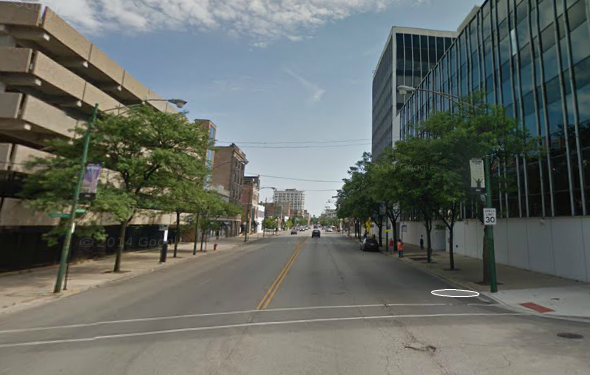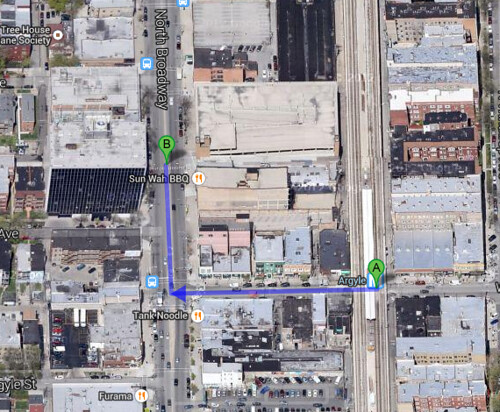Yesterday DNAinfo reported that a block club is pushing to expand permit parking in Uptown and Andersonville, in response to complaints that workers at a nearby office building are taking up too many parking spaces on side streets. The Illinois Department of Human Services recently took over three floors of a ten-story building at 5050 North Broadway, owned by Imperial Realty, to house about 400 workers. The building is otherwise largely empty.
Representatives for the DHS workers, local alderman Ameya Pawar, and Imperial all argued that the perceived parking woes should be addressed by providing free spaces for employees in a six-story garage across the street from the office, also owned by the real estate company. The lone voice of reason in the article came from a state official, who pointed out that public transportation is a viable alternative for getting to the building, located only a two-minute walk from the Red Line’s Argyle stop.
The Winona Foster Carmen Winnemac Block Club has been seeking support for converting about 1,100 curbside spaces on nearby side streets to permit parking. The process requires support from 65 percent of residents within the Block Club’s boundaries. Block club president Randy Heite said the move is necessary because there’s a dearth of parking for residents during the day, partly due to DHS workers using on-street spots.
Fran Tobin, an organizer from the Alliance for Community Services, which includes a union representing state employees, claimed that the parking shortage is to blame for workers arriving late to the DHS offices. “They are driving around and around, looking for parking," he said.
Since there are roughly 400 employees and about 200 clients visiting each day, he argued that several hundred spaces are needed. Tobin said state officials should “take responsibility for the damage they've made,” by addressing the perceived parking nightmare. He said that renting spaces for employees at the garage, which has room for more than 600 cars, “would certainly be the most logical thing to do.”
Pawar’s chief of staff Jim endorsed that idea. "The ideal solution here would be for the State of Illinois to provide parking for their employees," he said. Imperial president Alfred Klairmont said that, as a show of goodwill, he planned to give the state 66 free parking passes for employees. He noted that only about 30 DHS workers currently pay for spaces, which cost $125 per month.
Understandably, the state has not expressed interest in spending money to encourage employees to drive to an office a stone’s throw from an 'L' stop. Illinois Department of Central Management Services spokesman Mike Claffey told DNA the state’s policy is to "encourage employees to use mass transit, and other sustainable transportation means, whenever they are available." He added, "If an employee chooses to drive to work, they are responsible for parking legally.”
Some DHS employees truly may not have practical alternatives to driving to work, and others may need to use a car during the day in order to serve their clients. Car-sharing vehicles housed at the garage would be a good way to address the latter type of trip.
However, it’s likely that the Red Line, buses, walking, and/or biking would be fairly easy alternatives for dozens, if not hundreds, of their colleagues who are currently choosing to drive because it seems more convenient. If permit parking is implemented, it’s likely that these folks would reconsider their options and the overall demand for parking would be greatly reduced.
One commenter on the DNA piece noted that the state could create incentives for employees to leave their cars at home. The reader suggested offering discounted transit passes, or helping to establish shuttle bus service between the Ravenswood Metra station and Uptown’s business districts.
Commenter Peter Chen nicely summed up the folly of addressing the perceived parking shortage by providing additional free parking. “If people would simply switch to public transportation (unless [a car is] absolutely needed, not merely more convenient), there would be plenty of parking,” he wrote. “People have the right to choose to drive, but that choice may come with parking and traffic issues -- that's just the ‘cost’ of their choice. So, if you don't want to have to deal with parking and traffic issues, don't drive.”






